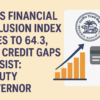
The Reserve Bank of India has released new guidelines for the prudential treatment of Bad and Doubtful Debt Reserve (BDDR) by co-operative banks. The circular, aimed at bringing uniformity in the treatment of BDDR for prudential purposes, comes into effect immediately.
Key points of the new guidelines include:
- With effect from the FY 2024-25, all provisions as per Income Recognition, Asset Classification and Provisioning (IRACP) norms, whether accounted for under the head “BDDR” or any other head of account, shall be charged as an expense to the P&L account in the accounting period in which they are recognised. The eligibility of such provisions for regulatory capital purposes shall continue to be as defined in the extant guidelines on capital adequacy.
- After charging all applicable provisions as per IRACP norms and other extant regulations to the P&L Account, banks may make any appropriations of net profits below the line to BDDR, if required as per the applicable statutes or otherwise.
- A one-time measure has been introduced to facilitate a smoother transition to an Accounting Standard (AS) compliant approach.
- Banks should comply with the provisions of the respective State Co-operative Societies Acts / Multi-State Co-operative Societies Act, 2002 as applicable.
The RBI noted that the current practices of creating BDDR vary among cooperative banks. While in some cases, BDDR is created by recognising an expense in the Profit and Loss (P&L) Account, in other cases it is created through appropriations from net profits. In terms of Accounting Standard 5, all expenses which are recognised in a period should be included in the determination of net profit or loss for the period.
Consequently, not recognising the required provisions for Non-Performing Assets (NPAs) as an expense while arriving at the net profit in the P&L Account is not in consonance with extant Accounting Standards. Further, the treatment of BDDR for regulatory capital and reckoning of net NPAs varies across banks and in many cases has been observed to be at variance with regulatory norms.
The circular applies to all Primary (Urban) Co-operative Banks, State Co-operative Banks, and Central Co-operative Banks. This move is expected to bring more transparency and uniformity in the financial reporting of cooperative banks, potentially strengthening the overall banking sector.







